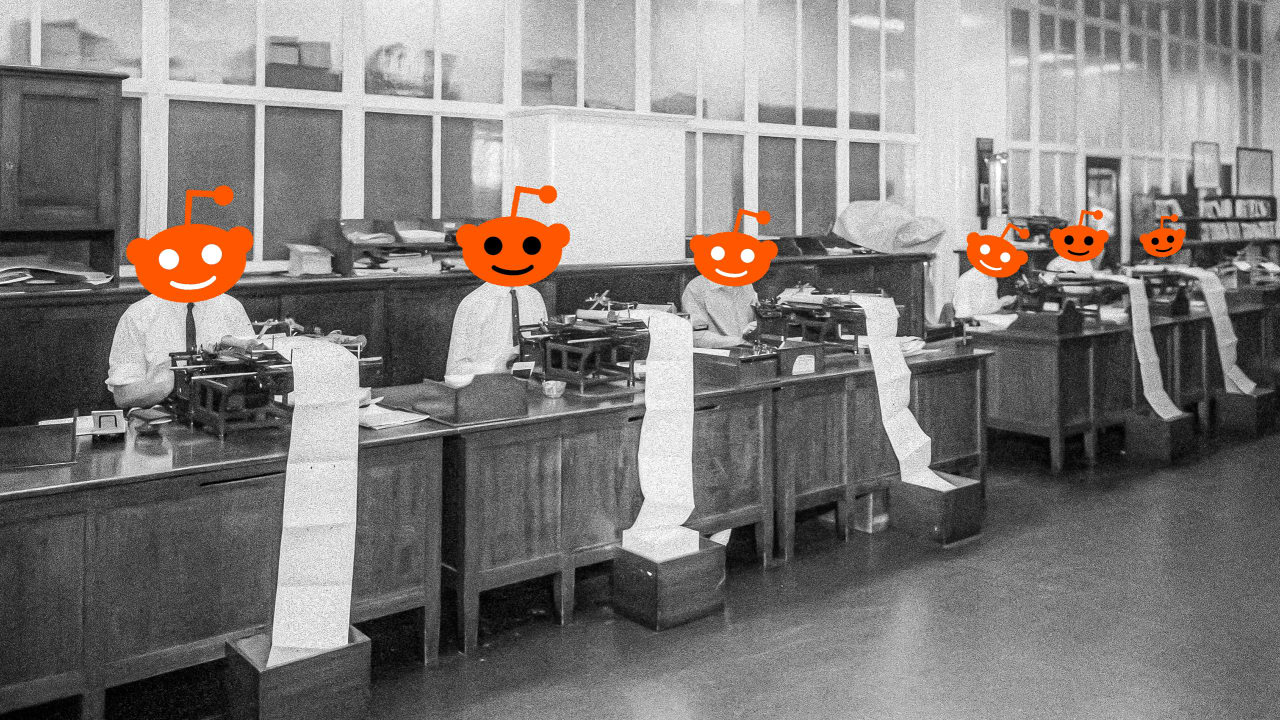How Reddit’s IPO could still go horribly wrong
Reddit went public in a long-awaited initial public offering on March 21, becoming the first social media company to do so since Pinterest in 2019. Once something of a lawless wilderness, Reddit has gone corporate over the past decade, reining in the fringe elements of its platform and issuing a ban on hate speech, all in the hopes of luring in big-money advertisers. The strategy has to some extent worked: Reddit reported nearly $800 million in annual advertising revenue in 2023. But one element from the earliest days of Reddit still remains: its army of volunteer moderators. Reddit is divided up into hundreds of thousands of active subreddits—communities as varied as WallStreetBets, the pop music forum PopHeads, and the confessional AmITheAsshole. Each subreddit is run by a handful of moderators, or mods, who set and enforce individualized rules and standards of decorum for the subreddit while ensuring the community—or its members—don’t run afoul of broader sitewide rules. And those mods are working on a purely volunteer basis. As Reddit goes public, it’s clear that mods are both the company’s foremost asset and liability. And given that Reddit has incentivized those very mods to buy into the IPO, can the company deliver value for its most vulnerable and temperamental shareholders? Social media companies aren’t your typical publicly traded companies. Every one—Meta, Pinterest, Snap, and to a lesser extent Amazon and Google (which own Twitch and YouTube, respectively)—depend on freely produced user-generated content. They make money by running ads against that free content; without it, their businesses would shrivel up. But Reddit’s business is significantly weirder because its mods also work for free, too, doing the bulk of the content moderation function typically reserved for full-time staff or paid contractors at peer companies. It’s as if Wikipedia became a for-profit business on the backs of their volunteer editors. There have always been tensions between mods and management. Mods sparred with Reddit executives last summer over their decision to significantly raise the price of the site’s application programming interface, which allows third-party developers to easily scrape Reddit content and build products based on its platform. Reddit’s goal was to prevent artificial intelligence firms from scraping their data and using it for large language model training data, but the policy also made it cost-prohibitive for beloved independent apps like the third-party client Apollo, which shut down as a result. In protest, moderators of popular subreddits took their communities dark, after which Reddit management threatened to replace them if they continued with their disobedience. Reddit replaced some mods, and most communities gave up their protest after a few weeks, marking a small win for the administration. When the IPO came around, Reddit decided to reward its 75,000 most devoted users and moderators with the ability to buy shares of stock at IPO pricing before the rest of the public could buy in. That’s a privilege typically reserved for institutional investors like hedge funds (though Robinhood, Uber, and Lyft all did something similar in their respective IPOs). When stocks IPO, they often experience a “pop” in their price once retail investors rush in and drive the price up, so Reddit clearly saw this as a peace offering for its power users and mods. Instead of paying them, why not give them a financial return and perhaps get them to fall in line with Reddit’s profit-maximizing goals? It makes sense—if it works out. In recent years, Reddit has hosted some of the most vibrant online communities of retail investors, such as the WallStreetBets subreddit credited with taking so-called meme stocks like GameStop and AMC Entertainment temporarily to incredible heights through collective buying efforts. But as Reddit enters the public markets, and hopes to attract investors of all kinds, its IPO share offering to its community presents a bigger problem than whether or not it becomes a meme stock and moves unnaturally in price. According to Reddit’s chief financial officer Drew Vollero, tens of thousands of Redditors bought IPO shares. The disaster scenario for Reddit is simple: the stock dies. Reddit’s stock debuted at $34 per share and is currently trading north of 51%, creating a nice return for any IPO investors that want to cash out now. But Reddit is the community of HODLing, WallStreetBets speak for sticking with a stock for the long run. There’s no guarantee that this stock price keeps going up—or even stays the same—and Reddit could quickly find that it’s losing money not only for its executives and employee shareholders who have bought in, but for its volunteer mods. Suddenly, the mods won’t just be unpaid workers, they’ll be money-losers, all thanks to Reddit. The result: They could bail on Reddit or grow even more embittered with management, exacerbating a

Reddit went public in a long-awaited initial public offering on March 21, becoming the first social media company to do so since Pinterest in 2019.
Once something of a lawless wilderness, Reddit has gone corporate over the past decade, reining in the fringe elements of its platform and issuing a ban on hate speech, all in the hopes of luring in big-money advertisers. The strategy has to some extent worked: Reddit reported nearly $800 million in annual advertising revenue in 2023.
But one element from the earliest days of Reddit still remains: its army of volunteer moderators.
Reddit is divided up into hundreds of thousands of active subreddits—communities as varied as WallStreetBets, the pop music forum PopHeads, and the confessional AmITheAsshole. Each subreddit is run by a handful of moderators, or mods, who set and enforce individualized rules and standards of decorum for the subreddit while ensuring the community—or its members—don’t run afoul of broader sitewide rules. And those mods are working on a purely volunteer basis.
As Reddit goes public, it’s clear that mods are both the company’s foremost asset and liability. And given that Reddit has incentivized those very mods to buy into the IPO, can the company deliver value for its most vulnerable and temperamental shareholders?
Social media companies aren’t your typical publicly traded companies. Every one—Meta, Pinterest, Snap, and to a lesser extent Amazon and Google (which own Twitch and YouTube, respectively)—depend on freely produced user-generated content. They make money by running ads against that free content; without it, their businesses would shrivel up.
But Reddit’s business is significantly weirder because its mods also work for free, too, doing the bulk of the content moderation function typically reserved for full-time staff or paid contractors at peer companies. It’s as if Wikipedia became a for-profit business on the backs of their volunteer editors.
There have always been tensions between mods and management. Mods sparred with Reddit executives last summer over their decision to significantly raise the price of the site’s application programming interface, which allows third-party developers to easily scrape Reddit content and build products based on its platform. Reddit’s goal was to prevent artificial intelligence firms from scraping their data and using it for large language model training data, but the policy also made it cost-prohibitive for beloved independent apps like the third-party client Apollo, which shut down as a result.
In protest, moderators of popular subreddits took their communities dark, after which Reddit management threatened to replace them if they continued with their disobedience. Reddit replaced some mods, and most communities gave up their protest after a few weeks, marking a small win for the administration.
When the IPO came around, Reddit decided to reward its 75,000 most devoted users and moderators with the ability to buy shares of stock at IPO pricing before the rest of the public could buy in. That’s a privilege typically reserved for institutional investors like hedge funds (though Robinhood, Uber, and Lyft all did something similar in their respective IPOs). When stocks IPO, they often experience a “pop” in their price once retail investors rush in and drive the price up, so Reddit clearly saw this as a peace offering for its power users and mods. Instead of paying them, why not give them a financial return and perhaps get them to fall in line with Reddit’s profit-maximizing goals? It makes sense—if it works out.
In recent years, Reddit has hosted some of the most vibrant online communities of retail investors, such as the WallStreetBets subreddit credited with taking so-called meme stocks like GameStop and AMC Entertainment temporarily to incredible heights through collective buying efforts. But as Reddit enters the public markets, and hopes to attract investors of all kinds, its IPO share offering to its community presents a bigger problem than whether or not it becomes a meme stock and moves unnaturally in price.
According to Reddit’s chief financial officer Drew Vollero, tens of thousands of Redditors bought IPO shares. The disaster scenario for Reddit is simple: the stock dies.
Reddit’s stock debuted at $34 per share and is currently trading north of 51%, creating a nice return for any IPO investors that want to cash out now. But Reddit is the community of HODLing, WallStreetBets speak for sticking with a stock for the long run. There’s no guarantee that this stock price keeps going up—or even stays the same—and Reddit could quickly find that it’s losing money not only for its executives and employee shareholders who have bought in, but for its volunteer mods. Suddenly, the mods won’t just be unpaid workers, they’ll be money-losers, all thanks to Reddit. The result: They could bail on Reddit or grow even more embittered with management, exacerbating already-salient tensions.
Robinhood debuted at $38 a share and now trades under $19 a share. Lyft’s debuted at $72 a share and has since sunk below $20 a share. Uber debuted at $45 a share and, while it trades at $80 per share now, it’s been a rollercoaster of a stock since its IPO.
Reddit has never been profitable, even with troves of free content and legions of free labor. If things go south for their investors, they risk further alienating their most important constituency. Without the unpaid work of mods, Reddit won’t be anything close to a $7 billion company.






















